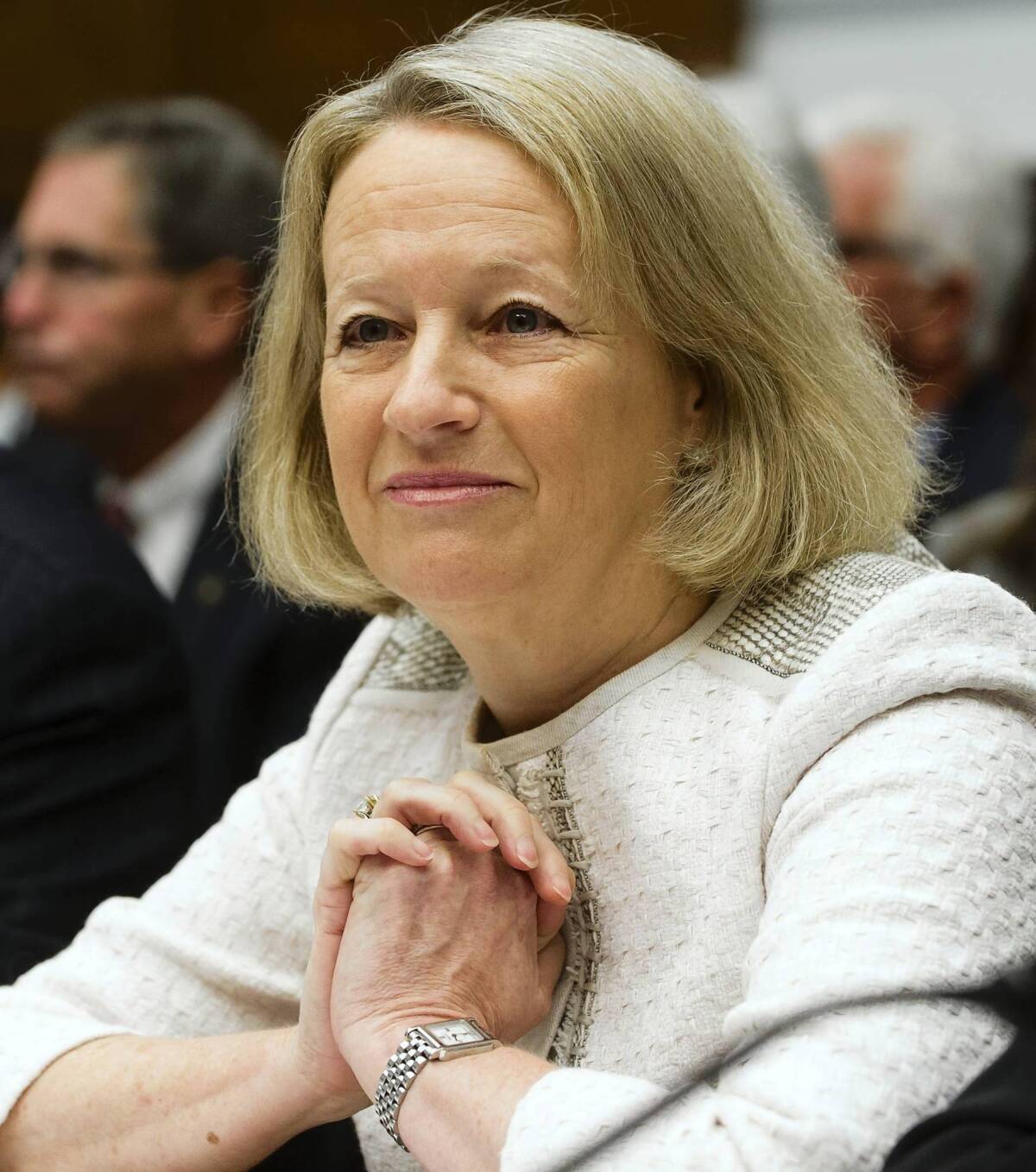SEC facing deadlock after chief Mary Schapiro quits

- Share via
WASHINGTON — Mary L. Schapiro’s departure as head of the Securities and Exchange Commission will leave the agency — at least temporarily — deadlocked as it continues to try to enact tough reforms on Wall Street.
Schapiro, 57, said Monday that she will resign effective Dec. 14. President Obama quickly designated SEC Commissioner Elisse B. Walter as the agency’s new chairwoman.
Walter is not expected to radically change the regulator’s agenda. But her move will leave the five-member SEC commission one person short — and effectively deadlocked on controversial issues such as Dodd-Frank financial reform, new regulations for money market mutual funds and a push to rein in high-speed trading.
“With the resignation of Schapiro, we have two Republicans, two Democrats, and they won’t agree on anything,” said John Coffee, a securities law expert at Columbia Law School.
Walter, a former executive at the Financial Industry Regulatory Authority and the National Assn. of Securities Dealers, has been a commissioner since 2008. She served as chairwoman for a short period in January 2009 after the departure of former Chairman Christopher Cox, before Schapiro was sworn in.
Since she already serves on the SEC commission, Walter could serve without Senate confirmation until the end of next year. But she would need Senate approval to stay longer as chairwoman, as would a nominee from outside the SEC. Obama has had difficulty getting nominees through the Senate, so the agency could remain one person short for a while.
The 62-year-old Walter said she was “deeply honored and humbled” to be the SEC’s next chairwoman and praised Schapiro for doing “an exceptional job.” She is mentioned as a possible long-term replacement. Other names floated are Mary J. Miller, assistant Treasury secretary for domestic finance, Sallie Krawcheck, a former executive at Bank of America and Citigroup, and Robert Khuzami, director of the SEC’s enforcement division.
It’s rare for SEC leaders to serve more than four years, and Schapiro’s departure had been widely expected. The first woman to serve as a non-interim chief of the agency, Schapiro served longer than 24 of the previous 28 heads, the SEC said.
Schapiro, who has served as chairwoman since January 2009, took over an agency under pressure to repair financial markets damaged by the financial crisis and facing criticism for failing to spot the Bernard Madoff Ponzi scheme. She then dealt with the fallout from the 2010 stock market flash crash, a contentious Republican House majority and the huge task of implementing complex regulations mandated by Dodd-Frank.
“She probably had the worst luck of any commissioner in history,” said former SEC Chairman Arthur Levitt.
Levitt lauded her performance as Wall Street’s top watchdog during one of the agency’s most difficult periods.
Schapiro took office a little more than a month after federal authorities arrested Madoff on charges of operating a multibillion-dollar Ponzi scheme for years. The SEC was sharply criticized, including by its own inspector general, for failing to uncover the largest such scheme despite repeated tips about Madoff’s activities.
“I think in many ways she saved the commission, which at the time she took over was in a real state of disarray and badly demoralized,” Levitt said. “Mary instilled a sort of sense of spirit and discipline that it lacked for the prior number of years.”
Obama said Schapiro knew the difficulties facing the SEC when she took the job, “but she accepted the challenge, and today, the SEC is stronger and our financial system is safer and better able to serve the American people.”
Schapiro cited a record number of enforcement actions by the agency during her tenure and improvements in its ability to pursue tips about market wrongdoing. The SEC brought 735 enforcement actions in the 2011 fiscal year, the most ever by the agency, and 734 actions in 2012.
“It has been an incredibly rewarding experience to work with so many dedicated SEC staff who strive every day to protect investors and ensure our markets operate with integrity,” she said.
But Schapiro had a rocky tenure, including battles with industry and Republicans in Congress, highlighted by her recent failure to gain SEC approval for new money market fund regulations.
“I think that she clearly came into the job with an agenda of things she wanted to accomplish that would have been beneficial to investors,” said Barbara Roper, director of investor protection for the Consumer Federation of America. “Unfortunately, much of that work is left undone and much of the Dodd-Frank rule-making is still undone.”
Walter’s priorities as a commissioner — tighter regulations of registered investment advisors and the municipal bond market, for example — could provide insight into her agenda as chairwoman of the SEC, said Kenneth Bentsen, executive vice president for public policy and advocacy for the Securities Industry and Financial Markets Assn. in Washington.
But a divided SEC, with only four commissioners after Schapiro’s departure, could create problems for the agency, Bentsen said.
“If you’ve got paralysis in the agency, that can be problematic,” he said. “They have a lot to do on their agenda.”
Walter is viewed as a loyal ally to Schapiro, though at times has pushed for tougher regulations. Experts don’t expect major shifts at the SEC under Walter, who might face an even tougher time dealing with Congress than Schapiro did.
“I have a lot of respect for the integrity and ability of Elisse Walter, but I’m not sure she has the political skill or clout of Mary Schapiro, who really did understand Washington,” Coffee said.
Despite that understanding, Schapiro had trouble getting lawmakers to significantly increase the agency’s budget, he said. Roper said she hoped for a more combative SEC chief than Schapiro turned out to be.
“Under the circumstances, the job demanded someone with a thicker hide than she has, someone more willing to stand up to pressure from people who frankly don’t want the agency to succeed,” Roper said. “She’s someone who is inclined to get along and find consensus.… It’s a very good quality in a friend or family member, but it’s not a good quality in an SEC chairman at this time.”
Puzzanghera reported from Washington, and Tangel from New York.
More to Read
Inside the business of entertainment
The Wide Shot brings you news, analysis and insights on everything from streaming wars to production — and what it all means for the future.
You may occasionally receive promotional content from the Los Angeles Times.











